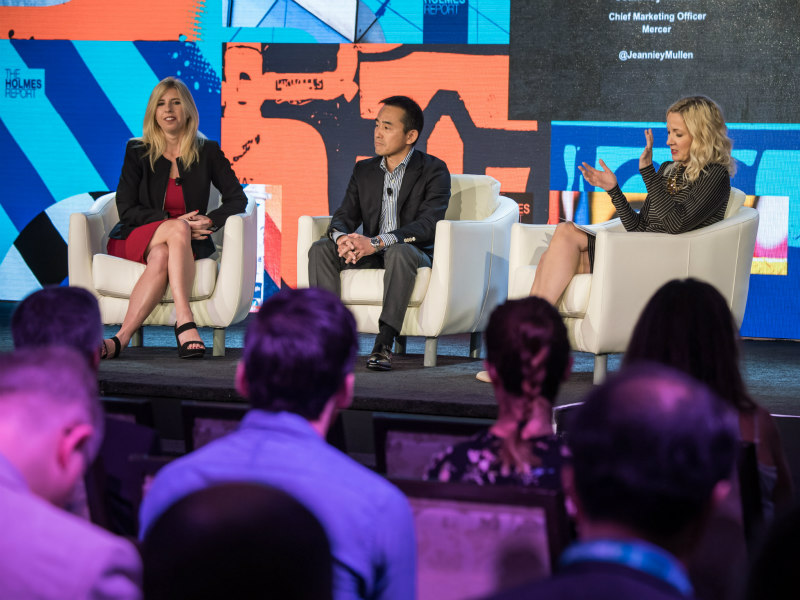Paul Holmes 25 Oct 2017 // 2:36PM GMT

MIAMI—“Millennials won’t buy anything unless it’s authentic,” Jeanniey Mullen, global chief marketing officer at consulting giant Mercer told the audience at PRovoke17 in Miami this morning, as part of a session sponsored Hill+Knowlton Strategies and moderated by the agency’s US president and global head of client services Erin Gentry.
The challenges of communicating with millennials—as customers and employees—was a major focus of a wide-ranging discussion, that touched on topics ranging from the importance of authenticity to the use of new technologies including virtual reality and augmented reality.
Mullen suggested that millennials could be divided into two groups, those who now have homes and families of their own, and those who don’t yet have those kinds of commitments. “As we look at generations in the workplace, we are finding that baby boomers—many of whom are grandparents of millennials—get along well with the millennials. There are some very successful reverse mentoring programs around social media, for example,”
She said that Mercer’s millennial workforce had become an useful focus group of sorts for some of the company’s external communications. “We are finding that young people want different kinds of benefits. They are looking for student loan repayments rather than financial planning for the future, for example. But we have also seen that the average millennial looking for a job will reach out to 36 people on social media as part of the process.”
Tadashi Matsushita, vice president of strategic planning for the Americas at All Nippon Airways, agreed that millennials posed challenges as consumers and as employees.
“As employees, meaning and flexibility are very important. They choose a job they are passionate about and connect to, rather than focusing on the highest possible salary. As for flexibility, many see the job as an important part of the life they are building, but they are less likely to compromise on that if it doesn’t fit their lifestyle. Company policies have to adopt.
“As far as engaging millennials as customers,” Matsushita said, “they are more interested in luxury experiences than luxury goods. That creates possibilities for a company like ANA, which delivers a luxury experience and also introduces customers to an authentic Japanese experience before travelers even reach Japan.”
Both Mullen and Matsushita agreed when Gentry suggested that marketing to millennials had raised the bar in terms of authenticity.
“Millennials won’t buy anything unless it’s authentic,” Mullen said. “Their celebrities are not the Kardassians, their celebrities are unboxers on YouTube. We believe everything has to be authentic, inspirational, and realistic. We call it AIR.”
Added Matsushita: ”For airlines, customer service and the customer experience are driven by authenticity and trust. And as values, trust and authenticity are very important in Japanee culture. So every individual in our airline understands the importance of trust and authenticity. Authenticity for ANA means providing the experience that is expected from a Japanese five-star airline.”
He said the airline had created an influencer marketing campaign with global DJ Steve Aoki specifically to reach millennials on their own platforms.
Both companies are experimenting with VR and AR. Said Mullen: “Augmented reality is something we are integrating into our initiatives. We just launched a new identity in Australia, and we enabled our CEO to appear in 3D to talk to our employees. To address the aging population, doctors can ‘hologram in’ and visit people in their homes.”
“AR and VR will provide unique experiences to consumers,” said Matsushita. “For us, we can communicate the experience on board the aircraft, inside the cabin. When it comes to applying those technologies in operations, we are trying to get out ahead of these technologies and our competition. We are experimenting with robots in airports to provide customer service. We are also using artificial intelligence for managing and controlling aircraft parts.”
Other topics of discussion included demographic changes. Said Mullen, “Babies born in 2007 are expected to live until they are 100. That has some huge implications for how long they will stay in the workforce. It raises healthcare issues too, as well as how they will plan for their financial security in retirement.”
In an environment with so many changes and challenges, Mullen said, “the role of the global CMO has changed from being general brand builder through messaging and experience to being a strategic business partner. I work more closely today with chief human resources officer and the chief technology officer, and we are all focusing in on business results.”
And the role of public relations agencies has been elevated, Matsushita suggested. “The biggest challenge for us is i dealing with negative exposure that could easily go viral. The airline experience is a very emotional topic for people and in the age of social media certain things do go viral very quickly. we have to be ready to deal with that.”


































.jpg)

















